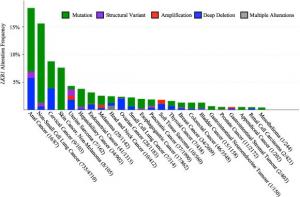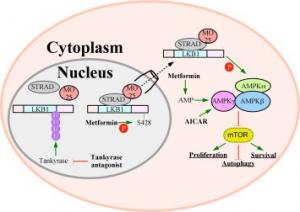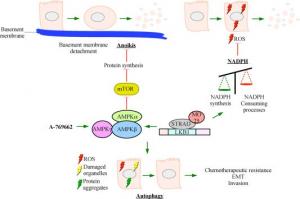
The alteration frequency including mutations, structural variants, amplifications, deep deletions, and multiple alterations of LKB1 in tumors. Listed in descending prevalence are LKB1 genetic alterations with the number of genetic alterations and total sp
A brief overview of the physiological and pathological role of LKB1 signaling.
CHONGQING, CHINA, February 20, 2025 /EINPresswire.com/ -- Mutations in serine-threonine kinase 11 (STK11) and liver kinase B1 (LKB1) are associated with disease progression in Peutz-Jeghers syndrome (PJS), which can progress to cancer. Previous studies have shown that LKB1 inactivation induces tumor formation in animal models, while its overexpression decreases microvessel density, tumor burden, and cell proliferation, marking LKB1 as a tumor suppressor. However, other findings suggest that LKB1 promotes tumorigenesis through activating ROS scavenging, DNA repair machinery, and autophagy, highlighting its paradoxical role in tumor biology.
This review, published in the Genes & Diseases journal by researchers from The Mary & John Knight Translational Ovarian Cancer Research Unit and Western University, Canada, explores both the tumor-suppressing and tumor-promoting functions of LKB1 signaling and provides insights into the biochemical processes that regulate its activity and the therapeutic relevance of targeting LKB1 signaling.
Somatic mutations in LKB1, along with structural variants, amplifications, and deletions have been identified in various cancer types, and LKB1 mutations have been shown to coincide and synergize with other mutations. Furthermore, LKB1 mutations act as prognostic biomarkers that influence treatment regimens. LKB1 substrates, including AMPK, ARKs, MARKs, SIKs, NUAKs, and SNRKs, regulate the tumor-suppressing or promoting functions of LKB1. Depending on the downstream pathways, LKB1-AMPK and LKB1-ARK signaling can either enhance or inhibit LKB1-mediated tumor progression. Hypermethylation of the LKB1 promoter is associated with tumorigenesis, while genomic alterations of the LKB1 gene such as deletions, rearrangements, and splicing, can produce truncated proteins. The catalytic activity of LKB1 is dependent on the pseudokinase STRAD and MO25, with mutations of these proteins proven to disrupt LKB1-STRAD-MO25 activity. LKB1-STRAD-MO25 promotes tumorigenesis by i) increasing NADPH levels, which protect cancer cells from ROS-mediated damage, and ii) enhancing autophagy, resulting in chemotherapeutic resistance, epithelial–mesenchymal transition (EMT), and invasion. Activation of the LKB1-AMPK-mTOR pathway protects tumor cells from anoikis, a form of cell death. Disrupting LKB1 activity may be achieved by blocking LKB1 kinase activity, nucleocytoplasmic shuttling, and STRAD binding. AMPK agonists, such as metformin and AICAR, represent possible therapeutic interventions targeting LKB1-AMPK signaling. Drugs such as erlotinib, metformin, bevacizumab, PARP inhibitors, ERK inhibitors, and biguanides exert cytotoxic effects in LKB-1 deficient cells.
The authors conclude by emphasizing the need to explore the context-specific roles of LKB1 and its regulation, particularly considering its paradoxical function in cancer. These insights provide a rationale for targeting LKB1 in cancer and underscore the importance of developing LKB1-specific inhibitors that could selectively antagonize LKB1.
Reference:
Title of the original paper: Insights into targeting LKB1 in tumorigenesis
DOI: https://doi.org/10.1016/j.gendis.2024.101402
Journal:
Genes and Diseases
Genes & Diseases is a journal for molecular and translational medicine. The journal primarily focuses on publishing investigations on the molecular bases and experimental therapeutics of human diseases. Publication formats include full length research article, review article, short communication, correspondence, perspectives, commentary, views on news, and research watch.
# # # # # #
Genes & Diseases publishes rigorously peer-reviewed and high quality original articles and authoritative reviews that focus on the molecular bases of human diseases. Emphasis is placed on hypothesis-driven, mechanistic studies relevant to pathogenesis and/or experimental therapeutics of human diseases. The journal has worldwide authorship, and a broad scope in basic and translational biomedical research of molecular biology, molecular genetics, and cell biology, including but not limited to cell proliferation and apoptosis, signal transduction, stem cell biology, developmental biology, gene regulation and epigenetics, cancer biology, immunity and infection, neuroscience, disease-specific animal models, gene and cell-based therapies, and regenerative medicine.
Scopus CiteScore: 7.3 | Impact Factor: 6.9
# # # # # #
More information: https://www.keaipublishing.com/en/journals/genes-and-diseases/
Editorial Board: https://www.keaipublishing.com/en/journals/genes-and-diseases/editorial-board/
All issues and articles in press are available online in ScienceDirect (https://www.sciencedirect.com/journal/genes-and-diseases).
Submissions to Genes & Disease may be made using Editorial Manager (https://www.editorialmanager.com/gendis/default.aspx ).
Print ISSN: 2352-4820
eISSN: 2352-3042
CN: 50-1221/R
Contact Us: editor@genesndiseases.com
X (formerly Twitter): @GenesNDiseases (https://x.com/GenesNDiseases)
Genes & Diseases Editorial Office
Genes & Diseases
+86 23 6571 4691
email us here
Visit us on social media:
Facebook
X
LinkedIn
Instagram
YouTube
Other
Legal Disclaimer:
EIN Presswire provides this news content "as is" without warranty of any kind. We do not accept any responsibility or liability for the accuracy, content, images, videos, licenses, completeness, legality, or reliability of the information contained in this article. If you have any complaints or copyright issues related to this article, kindly contact the author above.



